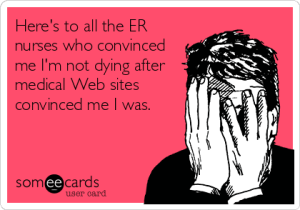Accessing credible health information online can be difficult for some people. Finding unreliable information online is inevitable since there are so many consumer websites and blogs from people without medical credentials. Furthermore, this information is available to everyone with internet and not everyone with internet access has the right health literacy to depict right from wrong. Some people may not have the time to go to the hospital or clinic so that they can get an informed explanation on their symptoms and instead use the internet as their health resource. I have started out with googling my symptoms, for example, and a cough has lead me to websites where I read about potentially having lung cancer or bronchitis. My personal experiences and current education have taught me how to look for reliable sources and understand health information that I read online. However, the Canadian Public Health Association (2008) states that “more than half of working age adults in Canada (55% or 11.7 million) are estimated to have less than adequate health literacy skills”(p.3). Health literacy is important when conducting research regarding your medical health so that you can understand what you are reading. When people do not understand what they are reading or are reading unrealiable information it can lead to confusion and psychological stress. In my case, for example, if i did not have the education the internet could have lead me to believe that I had bronchitis. Considering that almost 55% of working age adults in Canada have less than adequate health literacy (2008,p.3) it is important for the health care team to redirect patients to the right resources and present them with reliable information about their health. According to the College of Nurses of Ontario Ethic practice standards (2009), supporting a clients well-being means to further their health, and avoid or remove harm. Therefore, when nurses educate patients about health information online and where to find it, they are avoiding the psychological harm it can cause the patient and they are following the nursing standards.
College of Nurses of Ontario. (2009, June). Practice Standard: Ethics. Retrieved from http://www.cno.org/Global/docs/prac/41034_Ethics.pdf
Gordon-El-Bihbety, D., & Rootman, I. E. Canadian Public Health Association, (2008). A vision for a health literate canada: Report of the expert panel on health literacy.. Retrieved from website: http://www.cpha.ca/uploads/portals/h-l/report_e.pdf
Someecards. (Producer). (2013, 09 23). Here’s to all the ER nurses who convinced me I’m not dying after medical Web sites convinced me I was. [Web Graphic]. Retrieved from http://www.someecards.com/usercards/viewcard/MjAxMy0wMTM3YzJlODU2M2RiMmJk

